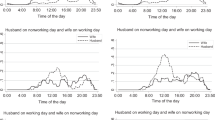Abstract
Coming back to the main models of division of work within the couple, the aim of this article is to analyze the possible transfers of domestic chores between partners facing an external shock. We test it by studying the allocation of domestic time on couples facing unemployment on the French time-use survey. Are domestic chores transferable between partners? Controlled for many covariates, bivariate tobit regressions on indicators of time, variety and number of activities show that domestic tasks performed by unemployed people, either men or women, increase. Despite the inertia due to couple’s specialization, the hypothesis of versatility is partially checked. “Dominantly Feminine tasks” are the more transferable tasks. Unemployment involves a new division of labor between spouses.
Similar content being viewed by others
References
Dominique Anxo Lennart Flood Yusuf Kocoglu (2002) ArticleTitle“Offre de Travail et Répartition des Activités Domestiques et Parentales au Sein du Couple: une Comparaison entre la France et la Suède” Economie et Statistiques 352–353 127–150
Thomas Aronson Sven-Olov Daunfeldt Magnus Wiksrtom (2001) ArticleTitle“Estimating Intrahousehold Allocation in a Collective Model with Household Production” Journal of Population Economics 4 569–584
Patricia F. Apps Ray Rees (1997) ArticleTitle“Collective Labor Supply and Household Production” Journal of Political Economy 105 178–204 Occurrence Handle10.1086/262070
Barrère-Maurisson, Marie-Agnés. (1992). La Division Familiale du Travail : la Vie en Double, PUF Paris Economie en Liberté
Gary S. Becker (1965) ArticleTitle“A Theory of the Allocation of Time” Economic Journal 75 493–517
Julie Brines (1994) ArticleTitle“Economic Dependency, Gender and the Division of Labor at Home” The American Journal of Sociology 100 652–688 Occurrence Handle10.1086/230577
Brousse, Cécile. (2000). La Répartition du Travail Domestique entre Conjoints reste très largement Spécialisée et Inégale. in France, Portrait Social 1999–2000, INSEE, 137–151
Anne Bustreel (2001) ArticleTitle“La Rationalité de la Non-Spécialisation dans les Ménage, une Rupture de la Théorie Beckerienne” Revue Economique 52 1157–1184
Pierre André Chiappori (1997) ArticleTitle“Introducing Household Production in Collective Models of Labour Supply” Journal of Political Economy 105 191–209 Occurrence Handle10.1086/262071
Engels, Friedich. (1845). The Condition of the Working Class in England, W.O. Henderson and W.H. Chaoloner (eds. in 1958), Stanford University Press.
Ekert-Jaffé, Olivia and Catherine Sofer. (1991). Un Point de Vue d’Economiste sur la Nuptialité, In Roussel Lyess and Hibert Thérèse (eds.), La Nuptialité: Evolution Récente en France et dans les Pays Développés . Congrés et Colloques n.7 INED-PUF
Ekert-Jaffé, Olivia and Anne Solaz. (2001), Unemployment, Marriage and Cohabitation in France, Journal of Socio-Economics, 75–98
Folbre, Nancy. (1993). “Socialism, Feminist and Scientific” 94–110, In Ferber Marianne A. and Nelson Julie A (eds.), Beyond economic man: Feminist Theory and Economics. The University of Chicago Press 178 p
Nancy Folbre Nelson Julie (2000) ArticleTitle“For Love or Money – Or Both?” Journal of Economic Perspectives 14 123–140 Occurrence Handle10.1257/jep.14.4.123
Reuben Gronau (1977) ArticleTitle“Leisure, Home Production, and Work––The Theory of the Allocation of Time revisited” Journal of Political Economy 85 1099–1123
Reuben Gronau (1997) ArticleTitle“The Theory of Home Production: The Past Ten years” Journal of Labor Economics 15 197–205 Occurrence Handle10.1086/209830
Gronau, Reuben and Daniel Hamermesh. (2001). The Demand for Variety: A Household Production Perspective, NBER Working Paper 8509 available at www.nber.org/papers/w8509.pdf
Amyra Grossbard-Shechtman (1984) ArticleTitle“A Theory of Allocation of Time in Markets for Labour and Marriage” The Economic Journal 94 863–882
Gillian K. Hadfield (1999) ArticleTitle“A Coordination Model of the Sexual Division of Labor” Journal of Economic Behavior & Organization 40 125–153 Occurrence Handle10.1016/S0167-2681(99)00053-0
Daniel Hamermesh (2002) ArticleTitle“Timing, Togetherness and Time Windfalls” Journal of Population Economics 15 601–623 Occurrence Handle10.1007/s001480100092
Joni Hersch Leslie S. Stratton (1994) ArticleTitle“Housework, Wages and the Division of Housework Time for Employed Spouses” American Economic Review Papers and Proceedings 84 120–125
Jacobsen, Joyce P. (1998). The Economics of Gender. Blackwell Publishers, 67–105
Thomas F. Juster Frank P. Stafford (1991) ArticleTitle“The Allocation of Time: Empirical Findings, Behavioral Models, and Problems of Measurement” Journal of Economic Literature 29 471–522
Longino, Helen E. (1993). Economics from Whom?, In Ferber Marianne A. and Nelson Julie A. (eds.), Beyond Economic Man: Feminist Theory and Economics. The University of Chicago Press, 158–168
Shelly Lundberg Robert A. Pollak (1993) ArticleTitle“Separate Spheres Bargaining and the Marriage Market” The Journal of Political Economy 101 988–1010
Lundberg, Shelly and Elaina Rose. (1998). “Determinants of Specialization Within Marriage.” Discussion 0048, Department of Economics, University of Washington
G. S. Maddala (1999) Limited-Dependent and Qualitative Variables in Econometrics Cambridge University Press Cambridge
Elaine. McCrate (1987) ArticleTitle“Trade, Merger and Employment: Economic theory on Marriage” Review of Radical Political Economics 19 73–89
Valerie K. Oppenheimer Kalmijn Matthijs Lim Nelson (1997) ArticleTitle“Men’s Career Development and Marriage Timing during a Period of Rising Inequality” Demography 3 311–330
Pailhé, Ariane and Anne Solaz. (2004). Is Parental Time Transferable Between Partners? The Case of Couples Facing Unemployment in France, mimeo INED
Rapoport, Benoit, Catherine Sofer, and Anne Solaz, (2003). Household Production in a Collective Model: Some New Results Working paper, Cahiers de la MSE, série blanche, n° 03039
Rapoport, Benoit, Catherine Sofer, and Anne Solaz, (forthcoming). La Production Domestique dans les Modèles Collectifs, Actualité Economique
Catherine Sofer Michel Sollogoub (1992) ArticleTitle“Confrontation de Trois Modèles de Mariage à partir de l’Analyse des Transferts Ordonnés du Divorce” Economie et Prévision 102–103 247–263
Weiss, Yoram. (1997). The Formation and Dissolution of Families: Why Marry?, Who Marries Whom? And What Happens upon Divorce In Handbook of Population and Family Economics, vol 1A, Mark R. Rosensweig, Oded Stark (Eds.). Northolland Elsevier
Bernard. Zarca (1990) ArticleTitle“La Division du Travail Domestique, Poids du Passé et Tensions au Sein du Couple” Economie et Statistique 228 29–40 Occurrence Handle10.3406/estat.1990.5410
Author information
Authors and Affiliations
Corresponding author
Additional information
I am gratefull for comments by two anonymous referees.
Rights and permissions
About this article
Cite this article
Solaz, A. Division of Domestic Work: Is There Adjustment Between Partners when One is Unemployed?. Rev Econ Household 3, 387–413 (2005). https://doi.org/10.1007/s11150-005-4941-1
Received:
Accepted:
Issue Date:
DOI: https://doi.org/10.1007/s11150-005-4941-1




